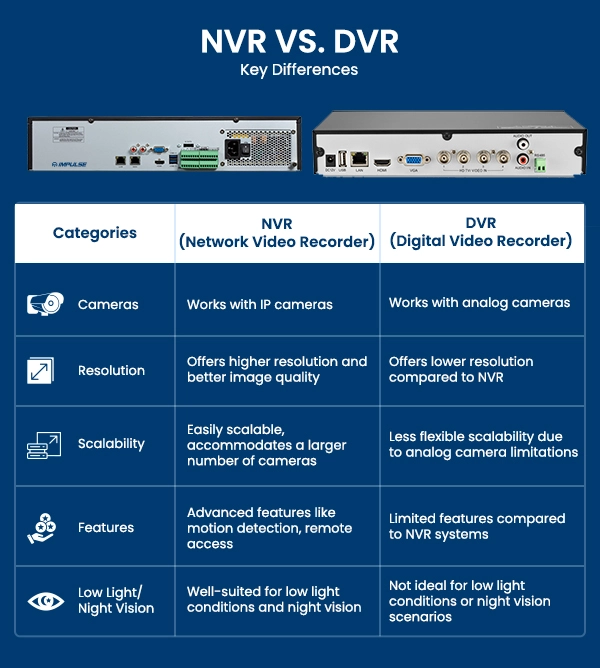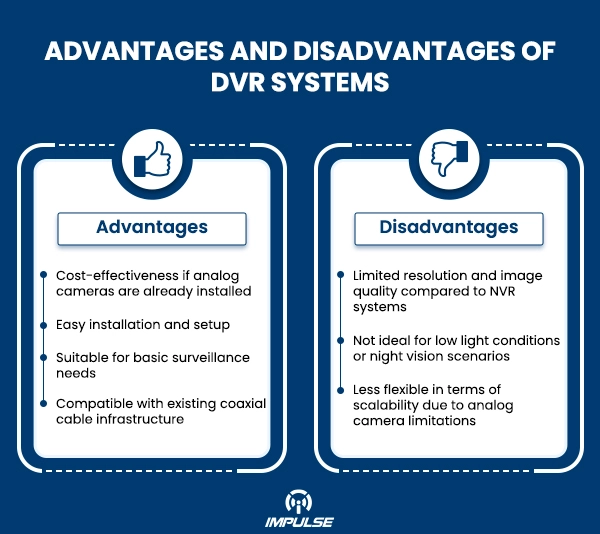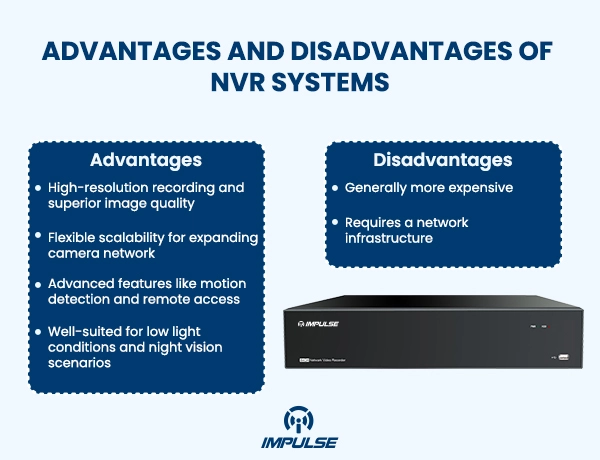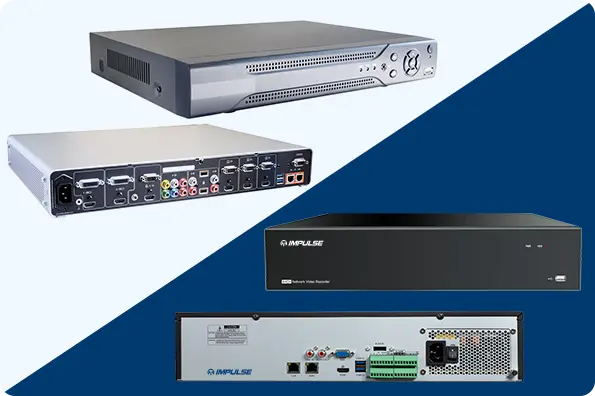In an era where security is paramount, protecting our homes, businesses, and loved ones is essential. And at the heart of any robust security plan lies a reliable and efficient security camera system. When it comes to choosing the right system, two names stand out: Network Video Recorder (NVR) and Digital Video Recorder (DVR). But which one is the game-changer for your security needs? In this guide, we’ll unlock the secrets of NVR and DVR systems, exploring their features, benefits, and considerations. Prepare to make an informed decision that will revolutionize your security setup.
Understanding DVR (Digital Video Recorder)
Let’s begin by exploring Digital Video Recorder (DVR) technology. DVR systems have been a staple in the security industry for many years. These systems are designed to record and store video footage captured by analog cameras. DVRs offer a range of features and benefits that make them an attractive option for security surveillance. Some of these features include motion detection, remote viewing capabilities, and the ability to search and playback recorded footage.
One of the primary advantages of DVR systems is their compatibility with analog cameras, which makes them a cost-effective choice for those who already have analog cameras installed. This compatibility allows users to upgrade their security system without the need to replace existing cameras. However, it is important to note that DVR systems may have limitations when it comes to resolution and scalability. Analog cameras generally offer lower resolution compared to their digital counterparts, which can impact the clarity and detail of the recorded footage. Additionally, DVR systems are not ideal for low light conditions or night vision, as analog cameras often struggle in these scenarios.
Understanding NVR (Network Video Recorder)
Now, let’s shift our focus to Network Video Recorder (NVR) technology. NVR systems have gained significant popularity in recent years due to their advanced features and capabilities. Unlike DVR systems, NVR systems work with IP (Internet Protocol) cameras, which capture and transmit video footage over a network. This digital transmission allows for higher-resolution recording, flexible scalability, and support for advanced features such as motion detection, intelligent analytics, and remote access.
One of the key advantages of NVR systems is their ability to provide high-resolution recording and superior image quality. IP cameras, which are compatible with NVR systems, offer higher resolution and better image clarity compared to analog cameras. This ensures that every detail is captured, providing valuable evidence in the event of an incident. Furthermore, NVR systems excel in low light conditions and night vision scenarios, as IP cameras often come equipped with infrared capabilities, enabling them to capture clear footage even in challenging lighting conditions.
Key Differences Between NVR and DVR
To gain a deeper understanding of the differences between NVR and DVR systems, let’s examine some key factors:

- Recording Technology: DVR systems record analog video using analog cameras, which capture footage through analog signals. On the other hand, NVR systems record digital video from IP cameras, which capture and transmit footage as digital data over a network.
- Camera Compatibility: DVR systems are specifically designed to work with analog cameras, which use coaxial cables to transmit video signals. NVR systems, on the other hand, are compatible with IP cameras that transmit video data over an IP network. This means that NVR systems offer more flexibility in terms of camera compatibility, as IP cameras come in a wide range of models and capabilities.
- Resolution and Image Quality: NVR systems generally offer higher resolution and better image quality compared to DVR systems. IP cameras used with NVR systems can capture and transmit high-resolution video, providing clearer and more detailed footage. In contrast, analog cameras used with DVR systems typically have lower resolution, which may result in less detailed or grainy footage.
- Scalability: NVR systems are more scalable compared to DVR systems. NVR systems can easily accommodate a larger number of cameras without compromising performance. This is because IP cameras used with NVR security systems connect to the network individually, allowing for easy expansion of the camera network. In contrast, DVR systems have limitations in terms of scalability due to the use of analog cameras and coaxial cables.
- Features and Functionality: NVR systems offer advanced features and functionalities that may be limited or unavailable in DVR systems. Some of these features include intelligent analytics, which enable the system to detect and analyze specific events or objects in the video footage. NVR security systems also often provide remote access capabilities, allowing users to view and manage the security system from anywhere using a computer or mobile device. Additionally, NVR systems can integrate with other security systems, such as access control or alarm systems, to create a comprehensive security solution.
- Low Light and Night Vision: NVR security systems are better suited for low light conditions and night vision scenarios compared to DVR systems. IP cameras used with NVR systems often come equipped with infrared (IR) capabilities, enabling them to capture clear footage even in challenging lighting conditions. This makes NVR systems the preferred choice for applications that require effective surveillance in low light environments or during nighttime.
Advantages and Disadvantages
When deciding between NVR and DVR systems for your security camera needs, it’s important to consider the advantages and disadvantages of each option. Understanding these factors will help you make an informed decision that aligns with your specific requirements.

Advantages of DVR systems
- Cost-effectiveness: If you already have analog cameras installed, DVR systems can be a cost-effective choice. You can utilize your existing infrastructure, saving on the cost of upgrading cameras.
- Easy installation and setup: DVR systems are relatively easy to install and set up, making them a convenient option for basic surveillance needs.
- Suitable for basic surveillance needs: If you require a simple surveillance setup without advanced features, DVR systems can fulfill your requirements.
- Compatible with existing coaxial cable infrastructure: DVR systems work with analog cameras that use coaxial cables, allowing for compatibility with your current infrastructure.
Disadvantages of DVR systems
- Limited resolution and image quality: Compared to NVR systems, DVR systems generally offer lower resolution and image quality. This can impact the clarity and detail of the recorded footage.
- Not ideal for low light conditions or night vision scenarios: Analog cameras used with DVR systems often struggle in low light conditions or night vision scenarios. This limitation can affect the effectiveness of surveillance in such situations.
- Less flexible in terms of scalability: DVR systems have limitations when it comes to scalability. The use of analog cameras and coaxial cables can make it more challenging to expand the camera network as compared to NVR systems.
Advantages of NVR systems
- High-resolution recording and superior image quality: NVR systems excel in capturing high-resolution video footage, resulting in superior image quality. This ensures that every detail is captured, providing valuable evidence in case of an incident.
- Flexible scalability: NVR security systems offer flexibility when it comes to scalability. They can accommodate a larger number of cameras without compromising performance. IP cameras used with NVR systems connect to the network individually, allowing for easy expansion of the camera network.
- Advanced features: NVR security systems come with advanced features such as motion detection, intelligent analytics, and remote access. These features enhance the functionality and effectiveness of your security camera system.
- Well-suited for low light conditions and night vision scenarios: IP cameras used with NVR systems often have infrared capabilities, enabling them to capture clear footage even in challenging lighting conditions. This makes NVR systems the preferred choice for applications that require effective surveillance in low light environments or during nighttime.
Disadvantages of NVR systems
- Generally more expensive: NVR security systems, especially when considering the cost of IP cameras, tend to be more expensive than DVR systems. The higher cost should be taken into account when considering your budget for the security camera system.
- Requires a network infrastructure: NVR security systems rely on a network infrastructure to connect and communicate with IP cameras. This infrastructure requirement should be considered when planning your security camera system.

Choosing the Right System for Your Needs
To ensure you select the most suitable system for your security camera needs, consider the following factors:
- Cost: Evaluate your budget and the overall cost of the system, including cameras, storage, and network infrastructure. Take into account any additional costs for installation, maintenance, and future upgrades. For commercial applications, it’s important to consider the scale of the project and the potential need for multiple cameras across different areas of the premises.
- Image Quality: Determine the desired image quality and resolution for your surveillance needs. Higher resolution cameras, such as those used with NVR security systems, can provide clearer and more detailed footage, which is beneficial for commercial applications where identifying specific details is crucial. This is particularly important in scenarios such as retail stores or industrial facilities where the ability to capture fine details can aid in investigations or monitoring critical areas.
- Scalability: Consider the potential for expanding your camera network in the future. For commercial settings, where a large number of cameras may be required, NVR security systems are more suitable due to their scalability. They can accommodate a larger number of cameras without compromising performance, allowing for comprehensive coverage of the premises. This scalability is especially important in environments such as office buildings or large industrial complexes where multiple cameras are needed to monitor different areas.
- Specific Features: Identify any specific features or functionalities that are crucial for your security requirements. Commercial applications often benefit from advanced features like motion detection, intelligent analytics, and remote access, which are commonly found in NVR security systems. These features enhance the functionality and effectiveness of the security camera system. For example, in retail stores, motion detection can help identify suspicious activities, while intelligent analytics can provide valuable insights for optimizing store layout and customer flow.
- Consultation: Seek advice from professionals or experts in the field to get tailored recommendations based on your specific needs. They can provide insights into the latest technology trends, industry best practices, and case studies related to commercial security camera systems, helping you make an informed decision. They can also assess the unique requirements of your commercial setting, such as the layout of the premises or any specific security challenges, and provide guidance on the most suitable system for your needs.
Experience superior image quality, high-resolution recording, and flexible scalability with Impulse CCTV. Our innovative NVR security systems offer unparalleled security for your peace of mind.
Real-World Applications
To further illustrate the practical applications of NVR and DVR systems in commercial settings, let’s explore some scenarios:
- Industrial Facilities: Industrial facilities require robust security systems to safeguard valuable assets and ensure worker safety. NVR security systems are ideal for these environments due to their ability to handle high-resolution cameras and advanced features. They can monitor critical areas, detect unauthorized access, and provide clear evidence in case of incidents or accidents. Features like motion detection and intelligent analytics can also help identify potential safety hazards or operational inefficiencies.
- Office Buildings: Office buildings often have complex security requirements, such as access control integration and monitoring multiple floors. NVR security systems offer seamless integration with other security systems, allowing for centralized management and control. The high-resolution recording and remote access capabilities of NVR security systems enhance security and provide flexibility for monitoring and managing the premises. Features like motion detection and intelligent analytics can help identify unauthorized access attempts or detect suspicious behavior.
- Highways and Transportation Networks: NVR and DVR systems play a crucial role in ensuring the safety and security of highways and transportation networks. They are used to monitor traffic flow, detect accidents or incidents, and identify potential security threats. These systems are often integrated with intelligent transportation systems to enable real-time monitoring and response.
Conclusion
Choosing between NVR (Network Video Recorder) and DVR (Digital Video Recorder) systems for your security camera needs is a decision that requires careful consideration of your specific requirements. Both NVR and DVR systems have their own unique advantages and limitations, but let’s put more emphasis on the benefits of using NVR.
When evaluating the factors, such as cost, image quality, scalability, and desired features, it becomes evident that NVR systems offer significant advantages. While DVR systems may be more cost-effective if you already have analog cameras installed, NVR systems provide high-resolution recording and superior image quality. The use of IP cameras with NVR allows for clearer and more detailed footage, which is crucial for applications where identifying specific details is essential, such as in retail stores or industrial facilities.
Scalability is another area where NVR systems outshine DVR systems. NVR systems can easily accommodate a larger number of cameras without compromising performance. The individual connection of IP cameras to the network allows for easy expansion of the camera network, making NVR systems ideal for environments like office buildings or large industrial complexes where comprehensive coverage is necessary.
Additionally, NVR systems offer advanced features and functionalities that are often limited or unavailable in DVR systems. Motion detection, intelligent analytics, and remote access capabilities are some of the features that enhance the functionality and effectiveness of NVR systems. These features are particularly beneficial in commercial applications, allowing for better surveillance and management of the security camera system.
Investing in a reliable security camera system is an investment in the safety and security of your property and loved ones. By selecting an NVR system that best suits your needs, you can enjoy the peace of mind that comes from knowing you have a robust and effective security solution in place.
At Impulse CCTV, we understand the importance of protecting what matters most to you. Our cutting-edge NVR security systems offer high-resolution recording, advanced features, and flexibility for your security needs.


